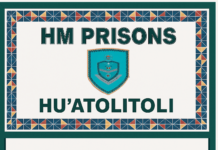Published on August 10, 2015.
Revisited.
A year after he was shot in Hawaiʻi, the death of former Auckland Detective Sergeant Tuʻiono Liavaʻa (Josh) continues to revive memories of the tragedy that surrounded his marriage to Princess Mele Siu’ilikutapu in 1969.
Liavaʻa, who was 66 when he died, led an adventurous and colourful life. His wedding to Princess Siu’ilikutapu was forcibly annulled by King Tupou IV, in accordance with his constitutional prerogative, after Siu’ilikutapu returned to Tonga.
Several songs were written about the annulment, among them a lament about the pain Liava’a felt as his marriage was torn apart.
Dr Malakai Koloamatangi from Massey University said that after the king annulled the marriage the story became embedded in the Tongan national psyche to the point that Liava’a and the princess become part of Tongan folklore.
Dr Koloamatangi described the story of Detective Sergeant Liava’a and Princess Siuʻilikutapu as a Tongan romantic saga that became a Shakespearean tragedy.
“When the story broke Josh’s father, who was working at the Post Office in Tonga, asked my father, Saimone Koloamatangi, lead guitarist for the Fofo’anga band, to compose a song for Josh, mainly to commemorate what had transpired, but also perhaps as a way of asking the king for forgiveness and offering him an olive branch,” he said.
The song was composed with a relative of his, Pita Vi, who was also a Fofo’anga member. Saimone, Pita Vi and Tongotongo Liavaʻa, Josh’s father, all worked together at the Post Office in Tonga. The song, which was very popular and is still sung to this day was titled ‘Aotearoa,’ which stood for the love and affection that bound Josh and the princess.
Some Tongan expressions like “Ko e foʻui ‘o e tuʻa ko e mamahi pe” or “the commoners deserved to feel pain” were used in the song.
After the marriage was made illegal, Princess Siuʻilikutapu was married to Hon. Kalaniuvalu Fotofili, who was born as Hon. Siosiua Ngalumoetutulu Kalaniuvalu-Fotofili. He died in 1998.
Her mother Princess Melenaite composed two songs, ‘Tapu ange moe kakala ‘iloa’ and ‘ ‘Ofa fakalangi’, to beg forgiveness for the princess from her husband.
“The songs allegorically speak of the new husband’s genealogy, birthplace, homeland and chiefliness as a way of edifying him while at the same time lowering the princess’ status, metaphorically, as penance for her previous conduct,” Dr Koloamatangi said.
“All three songs were performed and recorded by the Fōfōʻanga band. After its recording at the government-owned radio station, ‘Aotearoa’, was allowed airplay for a brief period before it was taken off the station’s repertoire, never to be aired again.
“I believe it has recently been reinstated. Apparently, the reason for taking it off the air was that it caused a lot of pain to too many people.”
Enigmatic
Dr Koloamatangi described Liavaʻa as an archetypical, enigmatic, Pacific-Polynesian male.
“He was at ease in most situations, at least in his public persona, adept at relating to people, but knowledgeable enough about protocol, custom and social nous not to breach social conventions.
“I was most impressed with the manner in which he could relate to people from all walks of life almost as soon as they met him, even if it was for the first time or during a chance encounter.
“But he was always concerned to do the ‘correct’ thing, for example his long time and, at times intense, involvement with protesting over Tongans’ right to the ‘Atalanga residence in Auckland. In many ways, Josh led a varied and interesting life.
“It was one of these ways, again an ‘acceptable’ Polynesian-Tongan trait in an almost culturally exotic sense, his penchant for female liaisons, both known and covert, that made him such a fascinating figure.
“More so when one considers that he was probably involved in these ‘affairs of the heart’ just to the right degree – not more or less. For example, when (some of) his legendary affairs became known he would increase the public’s sense of mystery by rejecting everyone’s demand and curiosity to hear his side of the story,” Dr Koloamatangi said.
Editor’s note:
I would like to allude to the song ʻAotearoaʻ. Dr Malakai Koloamatangi claimed the song was composed by his late father Saimone Koloamatangi’s relative Pita Vi. Saimone and Pita were both musicians and composers. However during Josh Liavaʻaʻs burial service in Auckland last year, his eldest brother ʻUhila Liavaʻa read out a version of a song called ʻAotearoaʻ as part of Josh’s eulogy. ʻUhila told mourners the song was originally composed by their father, the late Siosifa Tongotongo Liavaʻa, after Tuʻiono’s marriage to the Princess was annulled, and was given to Saimone and the Fofo’anga band to perform. The version read by ʻUhila was similar to the one recorded by Fofoʻanga. The only differences were that the version attributed to Pita Vi and recorded by Fofo’anga consisted of four verses and a chorus, while the one attributed to Josh’s father contained five verses and a chorus.
Dr Koloamatangi told Kaniva News the song was regarded by Fofo’anga members from the beginning as having been composed by Pita Vi. He said there was evidence in the song’s lyrics that Tongan sayings and terms used were common to Pita Vi’s other compositions. However, Dr Koloamatangi said he wanted to respect Josh’s family and give their father the full acknowledgement as composer of the song.
Kaniva understands Josh’s father composed another song to express his grief at what had happened to his son. The song known as ”Ise’isa e ta kuo o’o” or ‘Ise’isa was recorded by his own band, the Uipi ‘o e Halamaumau Koula string band, which was based in the town of Tofoa where he lived.
Censorship
The recording of Tongan songs at the time was made at the government sponsored national radio now known as Radio A3Z. The process was strictly monitored by a committee whose job was to make sure the lyrics aligned with the protocol and ethics of Tongan respect known as faka’apa’apa. Any songs that tended to express complaint and lamentation against the royals and nobles were strictly censored and at times not allowed on air.
This was what happened to the attempts by Josh’s father, who was also a musician and a composer, to lament the tragedy that befell his son. When it was first recorded, the ‘Ise’isa song allegedly failed to meet the approval of the committee and was not allowed on air because lamenting the wedding annulment would be seen as disrespectful to the king and his House.
It was believed this was the reason why Josh’s father asked Pita Vi and Koloamatagi to compose the song ‘Aotearoa’ to see if that song would make it on air. But as reported by Dr Koloamatangi, the songs went to air for only a short time before they were taken off. However, it appeared the Radio A3Z censorship committee has recently been more relaxed and both songs have been regularly heard on air.
(Please note that the translation into English is a mixture of word-for-word and an interpretive translation in which we attempt to render the exact contextual meaning of the songs in such a way that our English readers can comprehend them in their normal daily languages).
“Aoteoroa” (translated)
Let the north wind blows inAnd rest at FangatapuMy longing for what has gone pastTo a love that fell in battle.I try to understand, but cannotThe bond of love that has been brokenI vow to live with it and not to give it awayI am an innocent man made guiltyAotearoa, where the diamond cluster wasMy heart chose it for me to wearIt was given to me through heavenly mercyThe ecclesiastical mystery of the UnknownGoodbye my dear, I have gone astrayOur friendship lasted for only a few minutes.The fable was trueIt is a commoner’s lot to feel painChorusLet’s put the masila in and start rowingAdrift like an empty shell into the open seaLive like a slave day and nightIt is a common man’s lot in life.
Masila: Stick used to catch bonito
Fangatapu: The seafront of the Nuku’alofa royal palace
“‘Ise’isa” by Tongotongo Liava’a (translated)
Alas, the tragedy overwhelms me
Having love brings me a disastrous ending
My love and desire carried me off
I can only part with it when I die
My heart cries, but it was already stricken
After it was made clear it had been torn apart
My love brings me evil
I wish I was a leviathan
So I could face the consequences
The owl and pelican of the desert
Endure suffering day and night
I cannot withstand it
As I now utter my broken love
Let me cry to ease the pain
I wish it was possible
For us to halve my suffering
Let me carry it by myself
Ah my devotedness
A life such as that of a hanger-on
Who went in search for a country to live
His life was full of risks
My innocent heart wished it had never happened
I unknowingly dug my own grave
It was my misfortune, but I insisted
As that was the commoner’s share
Goodbye madam, let’s depart
I would drink in the pain and taste death
The enslaved love has been dissolved
“Aotearoa” (Tongan version)
Angiangi mai mu’a si’i Tokelau
Talolo hono ‘ea ‘i he fangatapu
‘a si’ete fakaanaua ki he kuo’alu
Ki ha ‘ofa lotolu kuo totau
Fiu fifili ka kuo ‘ikai pe
He talite feluteni kuo movete
Tuku keu tauleva ‘o tapu vete
Ko e tonuhia ‘a faiekina pe
Aotearoa moe pupunga taiamoni
Ne te fili loto keu teunga’aki
‘ae meesi ‘oku fakahevani
Ko e ‘ekelesia ‘oe ta’ehamai
Tofa mu’a kuo te si’i he
Si’a maheni kuo lau miniti pe
Pea mo’oni e lau ‘a e fepale
Ko e fo’ui ‘oe tu’a ko e mamahi pe
Chorus
Langa e masila moe tau’a’alo
Hungalu’opea ki he vahamama’o
Nofo hopoate ‘ihe po’uli moe ‘aho
Tufakanga ‘a pe ‘o kita ma’ulalo
ʻIseʻisa (Tongan version) by Tongotongo Liava’a
‘Ise’isa he tā kuo o’o
Feohi mo ‘ofa ta koe fakapō
Hahamu si’eku ‘ofa moe manako
Te u toki mate pea ‘e ngalo
Tangi e loto ni ka kuo te’ia
‘Ene mahino kuo vetekina
Si’eku ‘ofa ni koe mala ki a kita
Peheange mai ko ha levaiatani
Ke ma fe’ao moe nofo ‘amanaki
Lulu e toafa mo e pelikani
Pō mo e ‘aho he inu mamahi
He’ikai te u lava tu’uaki
Si’eku ‘ofani kuo manava’aki
Tuku pe ke u tangi na’a lelu ai
‘E te faka’amu ko ha me’a ‘e lava
Ke ma vaeua si’oto tufakanga
Tuku ai a keu fua tokotaha
‘Oi seuke ‘ete ‘osikiavelenga
Ha mo’ui kuo kainikavea
He kumi fonua mo e hehenga
Ha mo’ui ‘oku nofo ‘i lelenga
Ta’e’alo’aloa hoto loto vale
Ko si’oto fa’itoka ka te mūnoa pe
Ta ko hoto mala kau ‘afungi pe
He koe ‘inasi ia ‘o me’avale
Tōfā teine ta fai’aki e
Kau inu e mamahi ifo moe mate
Feluteni e ‘ofa kuo hopoate
“Tapu ange moe kakala ‘iloa” by Princess Melenaite (Tongan version)
Tapu ange mo e kakala ‘iloa
‘Atamai ni kuo luva pea li’oa
Pea ‘ilo ‘ehe Tokelau moe tonga
Teu tauleva ke lauikuonga
Fono’umata ‘o e funga vaomapa
Fanongoa ‘i he liku kakala
He mapo’i hingano fio heilala
Malie ‘oku fihi ‘ihe ngaahi ha’a
Te u ‘oatu si’i Toa Fotuloi
‘Ahopanilolo ko e fakamo’oni
He talite ‘o e ‘ofa faifeohi
‘Oku tapuhā pea tapu ke ‘osi
Chorus
He matangi ‘ene angi mokomoko
Kau lepa mei faletu’uloto
‘O vakaia ‘a siulolovao
He ko e tu’unga ‘o Ha’a Moheofo
“‘Ofa fakalangi” by Late Princess Melenaite
‘Ise’isa he po’uli to he fakakaukau
Uesia e loto ni ‘aofia ‘ehe kakapu
Vetekina ‘o ‘alaha talanoa he hahau
‘Alovili ‘e ‘ofa ni he moto ‘o takuilau
He tuinga louifi ko hoto saulavani
La’a ‘o ha’a mo’unga naite ‘oe ‘otu langi
Na’e tapa hono huelo ko ho vaikau’aki
Inumia e loloto ‘oe ‘ofa fakalangi
‘Oku tuha moe ‘imisi kapuina ‘e he mamahi
Siofia e naua fasi e liku tu’utai
Tui loto ‘ete ‘ofa hoto fakaofilani
Si’i fangalongonoa pele ‘eku ‘ofa mamahi
Talanoa e matangi fanga mata’itofe
‘Anau e lotoni langi he pitutaukae
Vaomapa moe fa ‘alaha he vai o lupe
‘E tuaikaepau fakamolemole pe
Chorus
‘Ofa loto he kakala ko si’oto salusalu
Toli he kolo kakala ‘I he langi tu’oteau
Neongo e fatulisi moe loka e peau
He ‘ofa ni tupulaki ki he pa’angangalu
More information








